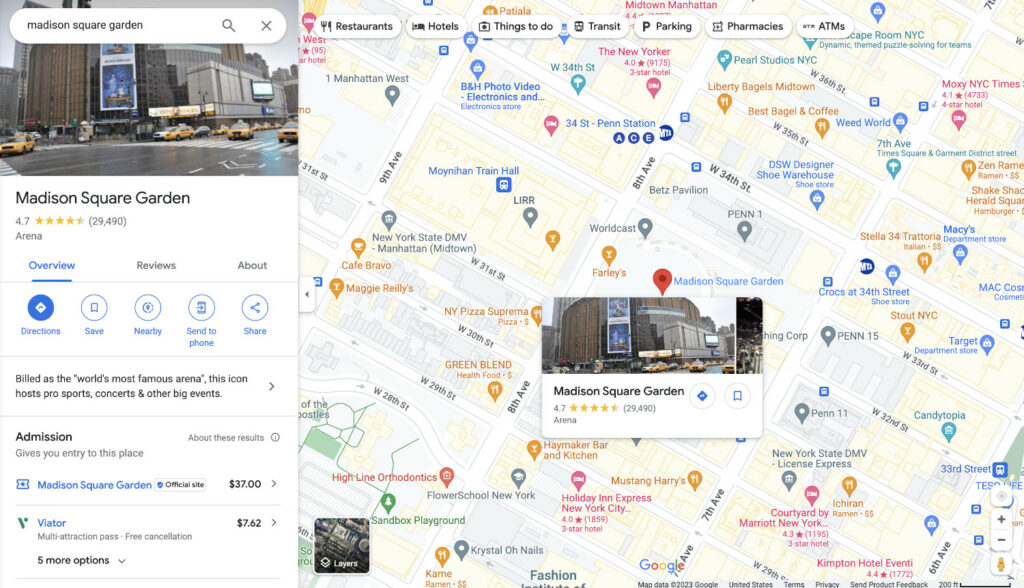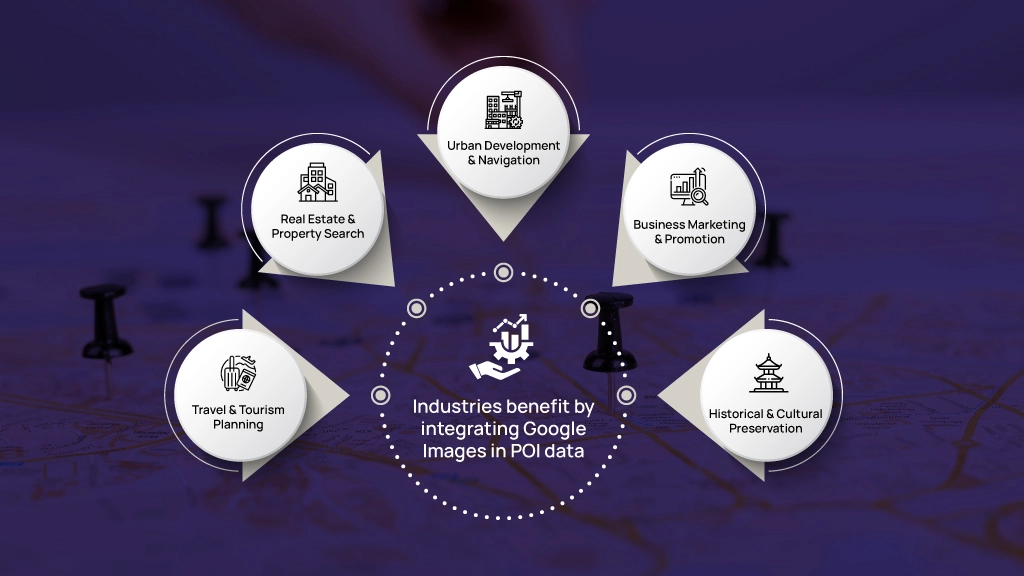Unveiling the power of visual context for immersive location and search experiences

Location-based information is a crucial asset for businesses, marketers, researchers, and individuals to make data-driven decisions.
Point of Interest (POI) data, which provides information about specific locations such as landmarks, businesses, and attractions, is an invaluable resource for a wide range of applications. However, to truly harness its potential, it’s important to go beyond text-based information.
This is where extracting Google Images comes into play, offering a unique and powerful way to enrich POI data with visual context and depth.
Power of Visual Context in POI Data
Visual content has a remarkable impact on human perception and understanding. The power of the visual medium lies in its ability to transcend language and convey complex information instantaneously.
Visual context enriches our understanding, enhances communication, and fuels creativity. In a world inundated with information, a single image can encapsulate an entire story, making the concept of visual context an indispensable tool for effective communication and meaningful connection.
Incorporating Google Images into your POI data points and records can provide a holistic view of a location, helping users connect with the information on a deeper level.

1. Image identification & location context
Scraping images from Google Images can provide visual cues that help users identify a location, and understand its surroundings.
For instance, an image of a renowned monument or landmark instantly communicates the essence of a place, making it easier for users to pinpoint it on a map, or recognize it in real life.
2. Enhancing descriptions
Images can enhance the descriptive information associated with a POI.
Imagine searching for a local restaurant, and being able to see images of its ambiance, decor and dishes. These images provide a richer depiction of the establishment, enabling users to make informed decisions.
3. Categorization & classification
Categorizing POIs can be more accurate and intuitive with the help of scraped images.
Visual elements, such as architectural styles or store signage, can aid in distinguishing between different types of businesses within the same category, improving the granularity of data.

Enriching POI Data: Practical Applications
The integration of scraped Google Images into POI data unlocks a world of possibilities across various domains and industries:
1. Tourism & travel planning
For travelers seeking information about destinations, images offer a glimpse into the attractions, landscapes, and cultural experiences they can expect. Visualizing a location’s beauty and uniqueness can inspire wanderlust, and guide travel decisions.
Prospective travelers are more likely to book vacations when they know exactly what to expect.
2. Real estate & property search
In the realm of real estate, images play a pivotal role in helping potential buyers or renters visualize properties. A POI listing with interior and exterior images can provide a comprehensive view of a property’s features and layout.
These images transcend descriptions, allowing individuals to envision their life within a space and make informed decisions, bridging the gap between digital viewing and physical visits.

3. Urban development & navigation
Scraped images revolutionize urban planning and navigation. Urban developers gain insights by virtually observing a location’s current state, aiding in informed decisions about enhancements.
Additionally, visual wayfinding integrates seamlessly into city exploration. As users traverse complex urban mazes, images of distinctive landmarks and pathways become a visual compass, enabling fluid navigation and immersive urban experiences.
4. Business marketing & promotion
Businesses leverage the persuasive power of images to captivate audiences, and drive engagement. From showcasing culinary delights in restaurants to capturing the allure of boutique fashion, scraped images forge emotional connections.
Customers are transported to the heart of a café, the ambience of a store, or the excitement of a live event, thus catalyzing interest and influencing their choices.
5. Historical & cultural preservation
Scraped images assume a role in safeguarding cultural heritage. Historical sites, artifacts, and traditions are vividly preserved through imagery, offering windows to the past. Museums and institutions digitize their treasures, sharing immersive narratives that transcend time. The rich tapestry of history becomes accessible, fostering a deeper appreciation for our heritage.

Navigating challenges & considerations
While extracting Google Images can significantly enhance POI data, it’s important to approach this process thoughtfully and ethically:
1. Copyright & permissions
Respect copyright laws and intellectual property rights. Ensure that you have the necessary permissions to use the scraped images, especially if they are owned by individuals, businesses, or organizations.
2. Data quality & accuracy
Scraped images should align with the intended purpose of the POI data. Verify the accuracy of images to ensure they accurately represent the location and its features.
3. Data storage & management
Managing a repository of scraped images alongside POI data requires efficient data storage and retrieval systems. Organizing images and associating them with relevant POI information is vital for a seamless user experience.
Conclusion
Incorporating visual context by scraping Google Images has the potential to revolutionize how we perceive and interact with Point of Interest (POI) data. Beyond mere text, images provide a powerful means to convey information, evoke emotions, and facilitate better decision-making. Therefore, Google image scraping is critical to enrich your Point of Interest Dataset.
As technology continues to advance, harnessing the power of visual data enrichment can lead to more immersive and engaging experiences across a myriad of applications. However, it’s imperative to tread carefully, respecting legal and ethical considerations while leveraging the transformative capabilities of image-enriched POI data.
Also read:



About Grepsr
In light of all the advantages we’ve talked about in this post, chances are you would want to incorporate Google Images into all future POI datasets. As such, you need a trusted data provider who can provide the service quickly, and equally importantly, at scale.
At Grepsr, we have 10+ years of experience in providing high-quality data to all our customers with minimal turnaround time. Whatever your data needs, feel free to share them with us. We’re sure we can work out a solution for you!











